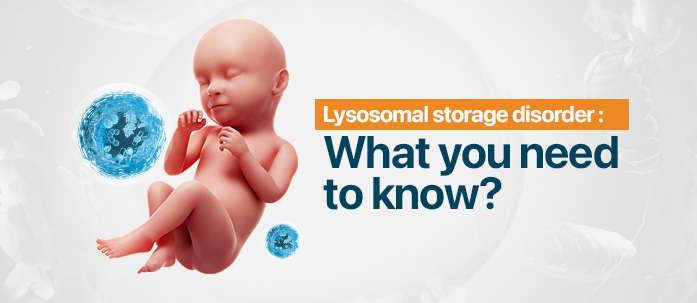Spotlight on rare metabolic disorder Lysosomal storage disorder: What you need to know?
We endeavor to reduce stress in our lives and engage to maintain good health, but we must have noticed once in our life with abnormal facial or body features in an infant or a child. Do you ever think about them, what causes them to look much, and why there is a lack of awareness about it? This blog will provide answers to most of your questions.
Every day the food we eat gets processed and energy is stored in our body by chemical reactions called metabolism. If there is a disruption in this chemical reaction, it could result in metabolic disorders. Yes, what you are thinking is right Diabetes is also a metabolic disorder in those people whose metabolism does not work normally.
As the title explains, we are concerned about rare metabolic disorders Lysosomal storage disorder. Lysosomes are the organelles that play a major role in eliminating all unwanted substances present in human cells. The condition that causes due to the lack of enzymes in the Lysosomes is called a Lysosomal storage disease.
Why are Lysosomes important?
Before knowing the lysosomal storage disorder let’s understand what lysosomes are and why they are important.
Lysosome organelles also called suicidal bags, it involved in the breakdown of disease-causing pathogens, bad cholesterol, and dead cells or organelles in our body through the action of 50 different lysosomal enzymes. Mutation in the genes responsible for lysosomal enzyme production can cause problems with how they work.
What causes Lysosomal storage disorder?
Most Lysosomal disorders are inherited in an autosomal recessive manner, meaning that both the father and mother have to carry the recessive gene to have the disorder.
If these enzymes are defective, there is an accumulation of complex molecules in different organs causing organomegaly and damage to the respective organ.
Age onset varies based on the specific disease, ranging from early childhood to the fifth decade or later.
How is the disorder passed on?
Lysosomal storage disorders are inherited in either an autosomal recessive or X-linked recessive manner.
Autosomal recessive disorder

Need two mutant copies of alleles to manifest the disease which means the child receives the abnormal alleles from both parents.
X-linked recessive disease

The presence of a single affected gene in female result in a carrier due to the dosage compensation of the other X-chromosome. Whereas in males the single affected allele causes the disorder.
What are the most common lysosomal storage diseases?

What is the available diagnosis?
Lysosomal storage diseases are diagnosed through blood tests, urine tests, and genetic tests.
Many of the symptoms are similar to those of other diseases so diagnosis can be difficult. However, several tests can be used to help diagnose through a combination of blood tests, urine tests, and genetic tests.
One of the most common and efficient tests is the lysosomal enzyme assay, which measures the level of lysosomal enzymes in the blood or urine. This test confirms the diagnosis of the disorder, as the levels of lysosomal enzymes, will be abnormally high in patients with this condition. Other tests include DNA sequencing and ultrastructural analysis of the cells.
Can the disorder be diagnosed in the fetus during pregnancy?
YES…! If the couple has a family history or their child with lysosomal storage disease. The lysosomal enzyme assay test helps to screen the abnormal levels of lysosomal enzymes in a growing fetus.
Is there a cure?
There is no known cure for Lysosomal storage diseases, but treatment is available to help stabilize organ function or slow progression.
There is no one-size-fits-all treatment for this disease. Treatment options are based on the specific disease and include enzyme replacement therapy, hematopoietic stem cell transplantation, and medication. It can be diagnosed as early as the 11th week of pregnancy through a chorionic villi sample.
Enzyme replacement therapy – Involves giving patients injections of enzymes that help break down complex molecules.
Hematopoietic stem cell transplantation – Involves replacing the defective bone marrow with healthy donor cells.
Yoda suggests
Lysosomal storage disorder is a rare metabolic disorder that can lead to death if left untreated. Different treatment options are available to alleviate symptoms
Our major focus is on the diagnosis of prenatal, neonatal, and child in a large, multi-disciplinary diagnostics where a range of technicians has 12 years of experience in a broad range of rare metabolic disorders.
If your child shows symptoms of lysosomal storage disorder consult your doctor and get it diagnosed as soon as possible. If you have a family history or had a child with this condition it is advisable to get a prenatal lysosomal enzyme assay test. Yoda Diagnostics offers free Genetic Counselling this will aid to get a clear understanding of the disorder and the available diagnosis. Click on the link https://yodadiagnostics.com/ to book an appointment.






















